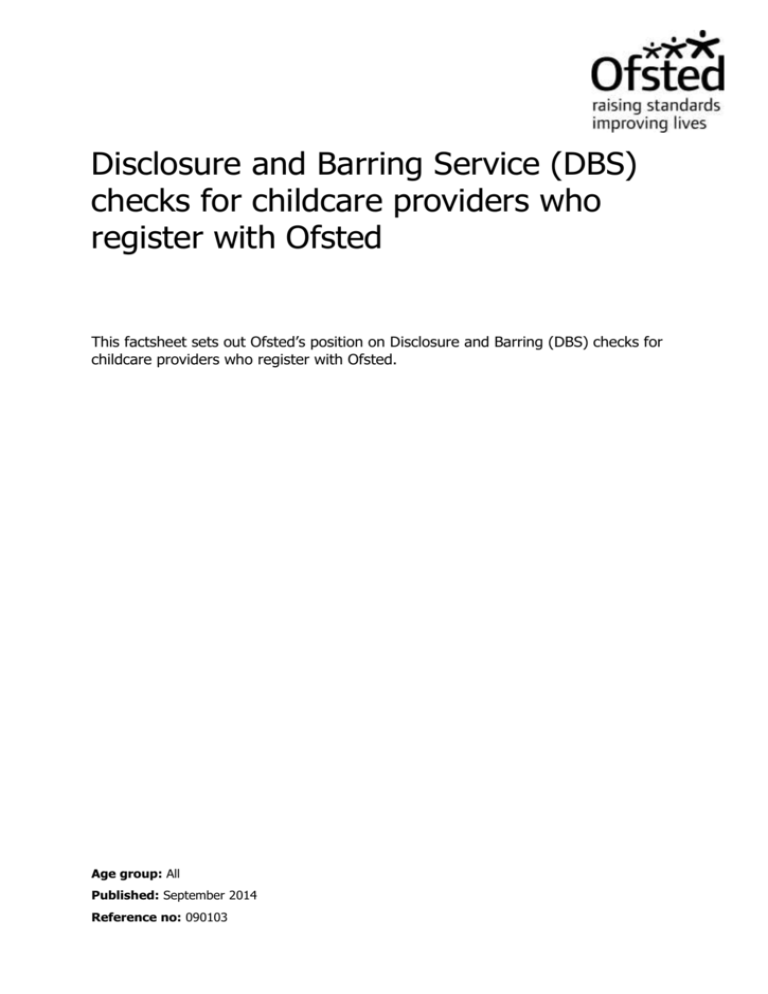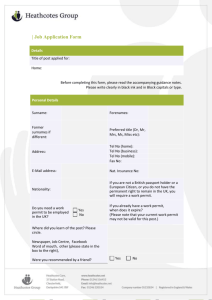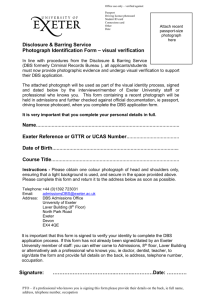(DBS) checks for childcare providers who register with Ofsted
advertisement

Disclosure and Barring Service (DBS) checks for childcare providers who register with Ofsted This factsheet sets out Ofsted’s position on Disclosure and Barring (DBS) checks for childcare providers who register with Ofsted. Age group: All Published: September 2014 Reference no: 090103 The Office for Standards in Education, Children's Services and Skills (Ofsted) regulates and inspects to achieve excellence in the care of children and young people, and in education and skills for learners of all ages. It regulates and inspects childcare and children's social care, and inspects the Children and Family Court Advisory Support Service (Cafcass), schools, colleges, initial teacher training, work-based learning and skills training, adult and community learning, and education and training in prisons and other secure establishments. It assesses council children’s services, and inspects services for looked after children, safeguarding and child protection. If you would like a copy of this document in a different format, such as large print or Braille, please telephone 0300 123 1231, or email enquiries@ofsted.gov.uk. You may reuse this information (not including logos) free of charge in any format or medium, under the terms of the Open Government Licence. To view this licence, visit www.nationalarchives.gov.uk/doc/open-government-licence/, write to the Information Policy Team, The National Archives, Kew, London TW9 4DU, or email: psi@nationalarchives.gsi.gov.uk. This publication is available at www.ofsted.gov.uk/resources/090103. To receive regular email alerts about new publications, including survey reports and school inspection reports, please visit our website and go to ‘Subscribe’. Ofsted Piccadilly Gate Store Street Manchester M1 2WD T: 0300 123 1231 Textphone: 0161 618 8524 E: enquiries@ofsted.gov.uk W: www.ofsted.gov.uk No. 090103 © Crown copyright 2014 Contents Introduction 4 The DBS update service 4 Accepting existing DBS checks obtained via other organisations 5 Retention of DBS checks 5 Repeating DBS checks for people already registered with Ofsted 5 Starting work before a DBS check is obtained 6 Our role in checking employers who use existing DBS checks 7 DBS checks for agency staff 8 DBS checks on children on domestic premises who turn 16 9 Students on work placements, volunteers and occasional visitors 10 Introduction This factsheet sets out our position on Disclosure and Barring Service (DBS) checks for childcare providers who register with Ofsted and those associated with them, such as people who live in a house where childcare takes place. It includes details about: when we require people to join the DBS update service when we will accept existing DBS checks obtained via another organisation retention of DBS checks when we require people who are already registered with or agreed suitable by Ofsted to repeat their DBS check whether we will let people start work before they have a DBS check our role in checking employers who use existing DBS checks DBS checks for agency workers DBS checks on children who reach 16 years of age and are living or working on domestic premises where childcare takes place – this applies to childminders and childcare on domestic premises registered on the Early Years Register and/or on the Childcare Register whether a student on placement or regular visitor to domestic premises were childcare is taking place has to have a new DBS check. The DBS update service The DBS update service lets applicants keep their DBS certificates up to date online and allows employers to check a certificate online. We require all new applicants who wish to register with Ofsted as a childcare provider or childminder, together with all individuals aged 16 or over who are associated with the application, to join the DBS update service as part of their application to register with us. This helps us monitor their ongoing suitability to work with and/or be in regular contact with children and to ensure that children are properly safeguarded. We do not require people who are already registered with us, or who we have already agreed are suitable to work with or be in regular contact with children, to join the update service unless they meet the criteria for repeating DBS checks (see section on repeating DBS checks below). For those we do not check – such as the manager and staff in nurseries that operate on non-domestic premises – it is the provider’s decision whether they require those that they employ to join the DBS update service. Providers should refer to the DBS guidance for employers for further information. This can be found at https://www.gov.uk/government/publications/dbs-update-service-employer-guide. 4 Disclosure and Barring Service (DBS) checks for childcare providers who register with Ofsted September 2014, No. 090103 Accepting existing DBS checks obtained via other organisations Ofsted will only accept DBS disclosure notices obtained via another organisation if it is an enhanced level check, the position applied for states ‘child workforce’ and the individual has also registered with the update service. Furthermore, if an individual is applying for a role which involves being at their home address we will only accept their DBS check if it has been obtained for a home-based role. Ofsted’s decision on portability only applies to those individuals and organisations for whom Ofsted makes the suitability decision; it does not apply to other people working in settings, where the employer has decided whether or not to allow portability (see separate section below on other staff members). Our decision on portability only applies to: childminders and other childcare providers on the Early Years Register childminders and other childcare providers on the Childcare Register, both voluntary and compulsory parts people in a childminder’s household and other people living or working on childminding premises or where childcare on domestic premises takes place Retention of DBS checks Providers should destroy original DBS disclosures within six months, which is the timeframe set out in the DBS code of practice.1 Providers should not retain the DBS disclosure itself but need to be able to show us they have kept a record of it. Inspectors will review the provider’s records to check that the required checks have been completed. Repeating DBS checks for people already registered with Ofsted We do not routinely repeat DBS checks on people who are already registered with us or we have agreed as suitable to work with children. We also do not need to carry out a DBS check on those people who are registered with us and have never had 1 For more information visit: https://www.gov.uk/government/publications/dbs-code-of-practice Disclosure and Barring Service (DBS) checks for childcare providers who register with Ofsted September 2014, No. 090103 5 one, for example, because they were employed or registered before the DBS scheme began2. However, a new DBS is required when a person who is already known to Ofsted applies to register a new childcare provision, or to take on a new role with an existing registration where Ofsted decides on suitability, if any of the following criteria apply: The new role gives greater access to children or has more responsibility. There has been a break of more than three months between leaving the old post and taking up the new post. There are concerns about the person, which may affect his or her suitability. They have never had a DBS check. If any of the above points apply, then the person will need a new DBS check and will need to join the DBS update service. They may not start work until it has been received. If a person’s DBS status changes or we receive information that suggests the person may no longer be suitable, we reserve the right to repeat any check – including the DBS. Starting work before a DBS check is obtained Ofsted will not register a person until we have obtained DBS checks on the person applying for registration and any other person who requires a DBS check because of their association, for example a member of the childminder’s household, or a member of the committee running a playgroup. We will also not register a person unless they have joined the DBS update service, as set out above. However, for other staff, where Ofsted does not decide on suitability, it may be possible in some circumstances for staff to start work before their DBS check is complete, subject to the following rules: In exceptional circumstances, when to wait for the DBS check might disrupt the care of children, staff may start work before a DBS check is complete. These rare situations may only happen when the DBS check has been applied for – if an application has not been made, the person may not start work. Any unchecked person must never be left unsupervised with children, and all children must always be within sight and hearing of a checked person. 2 On 1 September 2012 the Criminal Records Bureau (CRB) and the Independent Safeguarding Authority (ISA) merged into the Disclosure and Barring Service (DBS) - CRB checks are now called DBS checks. 6 Disclosure and Barring Service (DBS) checks for childcare providers who register with Ofsted September 2014, No. 090103 The employer (where there is one) must show Ofsted that there are robust recruitment and employment practices in place, including details of a DBS check on staff members. Our role in checking employers who use existing DBS checks When an organisation, such as a nursery, accepts existing DBS checks, inspectors will not automatically lower the judgement given at inspection. However, inspectors must ensure that the employer complies with the DBS guidance on portability. The DBS is clear that ultimately it is for the employer to decide whether to accept previously-issued DBS checks, but that employers should consider the following before making a decision: There is no official expiry date for a criminal record check issued by DBS. Any information revealed on a DBS certificate will be accurate at the time the certificate was issued. You should check the date of issue on the certificate to decide whether to request a newer one. In certain employment sectors a new criminal record check may be required periodically. You may also be required by law to carry out a fresh check of the DBS children’s and/or adults’ barring lists in accordance with sectorspecific guidance3. A person’s criminal record, or other relevant information, may have changed since the check was issued. The decision made by a Chief Police Officer to disclose information on a DBS certificate was made based on the position for which the criminal record check was originally applied for; you cannot assume that no other intelligence would be disclosed for a different position. The information revealed was based on the identity of the applicant, which was validated by another registered body, at the time that the original check was requested; you should ensure that the identity details on the certificate match those of the applicant A DBS certificate contains a number of security features which can be used to verify whether it has been counterfeited or altered in any way. Please see the DBS guidance for employers for further information. This can be found at https://www.gov.uk/dbs-check-requests-guidance-for-employers. http://www.legislation.gov.uk/ukpga/2006/47/contents This list replaced the three former barred lists – Protection of Children Act (POCA), Protection of Vulnerable Adults (POVA) and List 99 www.opsi.gov.uk/ACTS/acts1999/ukpga_19990014_en_1 and www.opsi.gov.uk/acts/acts2000/ukpga_20000014_en_1. 3 Disclosure and Barring Service (DBS) checks for childcare providers who register with Ofsted September 2014, No. 090103 7 Where an employer has used an existing DBS check, inspectors will look at how the organisation has used the DBS guidance on assessing the risk. Inspectors will look at the evidence given by the employer about their steps towards complying with the DBS guidance. In particular, inspectors will check that the employer has: applied for a new enhanced DBS check, even if they are letting the person start work using an existing check noticed any unexplained gaps in a person’s employment and if this is the case, that they have not let the person start work until they have their own DBS check. (Employers should not use an existing DBS check if there has been a break of more than three months in service) checked the details on the existing DBS check using forms of identity for the person concerned, for example, they have cross-referenced address and date of birth details from other identity documents seen the original DBS certificate, not a photocopy, and tried to contact the person who requested the original check, to confirm if any other information was released through a separate letter. (If other information was released, the employer must not let the person start work until they have a new DBS check.) only accepted an existing DBS check if it is at the right level, for example they have not accepted a standard check if an enhanced check is needed not accepted an existing DBS check that is too old. (A DBS check does not last for an agreed length of time, but it is best to expect that an existing check is no older than 12 months.) made sure that the person does not have unsupervised access to children, until the new DBS check can confirm the person’s suitability. If the employer cannot show that they have taken these steps, then the inspector will reflect this in the inspection judgement(s). If there is evidence that the employer has taken action in line with the DBS check guidance, then this will not affect the inspection judgement(s). DBS checks for agency staff Employment agencies and businesses must show a childcare organisation that the person put forward for a childcare position has been checked against the relevant list of those barred from working with children held by the Disclosure and Barring Service within the last 12 months. Employment agencies and businesses must provide written confirmation of this to the childcare organisation employing the person. As regulators, we have the same process to check suitability. This means that providers must show written confirmation from the agency that a DBS check has been carried out within the last 12 months to show that a person is suitable. 8 Disclosure and Barring Service (DBS) checks for childcare providers who register with Ofsted September 2014, No. 090103 DBS checks on children on domestic premises who turn 16 In terms of initiating DBS checks, when a child turns 16 years of age within a childminder’s household or in childcare on domestic premises, our position is as follows: All people aged 16 and over, living or working in households where childminding or childcare on domestic premises is provided, must be suitable to be in regular contact with children We are responsible for carrying out any necessary checks and making the suitability decision, as childminders and others providing childcare on domestic premises are not entitled to obtain an enhanced DBS check for their own household members. This will include checks on the manager for childcare on domestic premises. We ask applicants for registration as childminders and childcare on domestic premises to give us information about household members, including the dates of birth of all their children under16 years of age. We also expect these providers to notify us of any changes to people living in their households. We require this information so that we can make sure that when a person in a household turns 16, we take steps to carry out a DBS check on them and require them to join the DBS update service. Inspectors will check at each inspection whether there are any children about to turn 16 years of age, or who have turned 16 since the last inspection, and to establish whether any new people have joined the household. We expect all registered childminders and childcare providers on domestic premises, to tell us about changes to members of their household. However, we do not expect such providers to tell us when a member of their household reaches their 16th birthday. This is why we ask inspectors to check, before the inspection, whether any people recorded on our system as household members have turned 16, or are about to do so. Where we find that a member of the household has turned 16, we will not penalise the childminder or childcare provider for not telling us, as long as the provider had told us that the individual was a member of their household. However, we may take action against a childminder or provider of childcare on domestic premises if they have failed to notify us of a new household member. We only regard legal requirements about household members as not met if: the person we are attempting to check fails to respond to our requests to undergo a DBS check; or Disclosure and Barring Service (DBS) checks for childcare providers who register with Ofsted September 2014, No. 090103 9 if the childminder or childcare provider on domestic premises has failed to notify us of a new person joining or leaving the household, including the birth of a new baby. If, during an inspection, we have reason to believe that a childminder or childcare provider on domestic premises has withheld information from us, or has failed to inform us of a change to their household members, then this is a breach of legal requirements and will prompt an inspection judgement of ‘inadequate’ for safeguarding. In such cases, we will consider taking formal enforcement action against the provider as failure to notify us is also an offence. Students on work placements, volunteers and occasional visitors As set out above, Ofsted takes responsibility for undertaking DBS checks on those who are living or working on domestic premises, including childminding and childcare on domestic premises. Therefore, Ofsted will need to obtain an enhanced DBS check on students or volunteers working with childminders and other childcare providers on domestic premises who are to have regular, unsupervised contact with children. There are no provisions in the relevant legislation which state that the legal requirement only applies to placements of a certain length. There is no definition of ‘regular contact’ in this legislation, so Ofsted will take a common sense approach to deciding what is ‘regular’. For example, a student could have regular contact with children during the course of a short placement. Where a student on a work placement is likely to have regular contact with children, Ofsted will undertake a DBS check on that student. Where a student does not have regular contact with children (for example if they are only attending the placement as a ‘one-off’ arrangement) Ofsted will not require a DBS check. In such cases, the childminder or childcare provider must ensure that the student or volunteer is never left in unsupervised contact with children. We apply the same principles in deciding whether or not a person is a regular visitor to the household. For example, when deciding whether Ofsted requires a DBS check on a regular visitor, there is a difference between a friend of a childminder’s son who occasionally sleeps over, and an overseas student who is living in the house for several months. We will decide whether a DBS check is required on a regular visitor, taking account of how frequently, and for how long, the person is visiting the house. 10 Disclosure and Barring Service (DBS) checks for childcare providers who register with Ofsted September 2014, No. 090103



